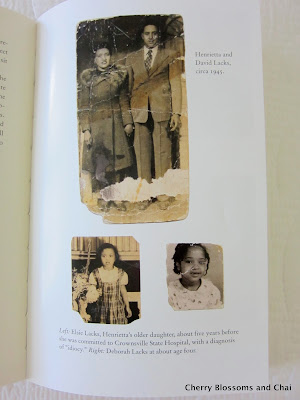I will try to not give too much information about the book as this is definitely one book everyone should read. It is written for the general audience, so you need no background in science to understand what it going on.
This book was the story of how the HeLa cell line came about. Almost all in vitro scientific research is performed on living cells that are cultured outside of the human body in dishes or flasks, supplemented with nutrient rich media to sustain them. All cell lines that are used in research have names given to them, either abbreviations for when the cell line was produced/generated, researchers initials (as with some of the cell lines in our lab), randomly generated numbers (which aren't really that random) or in the case of HeLa, the patients first and last initials. The book is written in the form of a story, going back and forth between the past of the present. It talks bout Henrietta's life (as much as is known) and the life of her children now. How she got sick, how her cells were taken without her knowledge, how her family knew nothing about the fact that Henrietta's cells came to be so famous and how the author and Deborah (Henrietta's daughter) went on a fact finding mission to unravel the truth of what actually happened.
HeLa is an immortal cell line (which means it never dies, as long as it has the "food" that it needs) that has been used in so many different areas of research, from helping to generate the polio vaccine, to understanding AIDS. It was the first cell line to be mass produced and sold throughout the world. It was really the first cell line that gave science its big push into finding cures and treatments for various diseases.
I never knew anything about HeLa, where it was from, who it was from, or how it came about. I remember last year, one of my professors in lecture said something about HeLa, but it was so fast in passing, that I didn't even pay attention to it or remember what he said. But, this book really explains a lot about the struggles, the lies, the lack of ethics and moral that went into the generation of this cell line. Her story really makes you realize the crimes that have been done against so many in the name of research and science. It also makes you realize how important every aspect of research really is and how more really needs to be done to protect and compensate the patients whom these cells are taken from.
The book doesn't end the way I hoped it would. Of course, this isn't a fairy tale, it's life. I just wish there was more that could be done for the family.
The book doesn't end the way I hoped it would. Of course, this isn't a fairy tale, it's life. I just wish there was more that could be done for the family.




I'm glad you read it - I've heard about it and read reviews - it's a fascinating case.
ReplyDelete